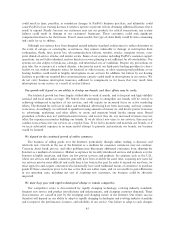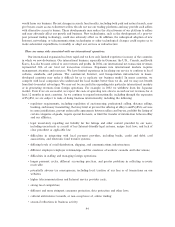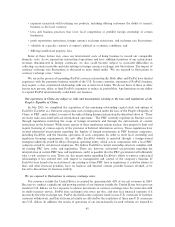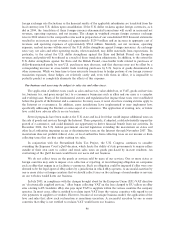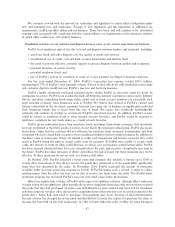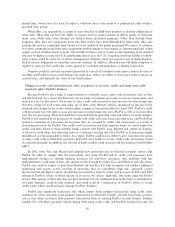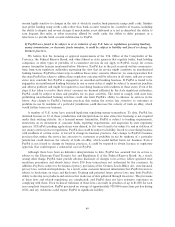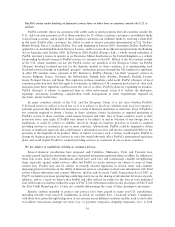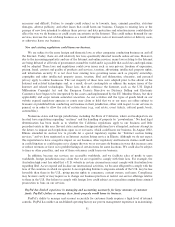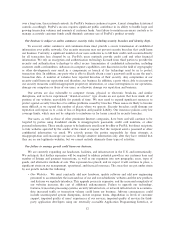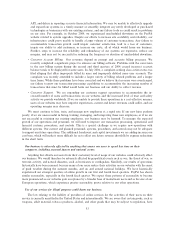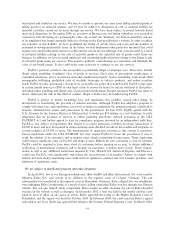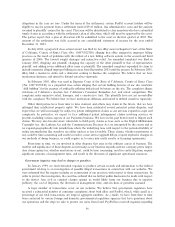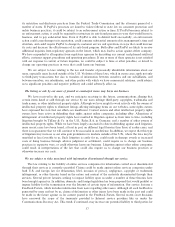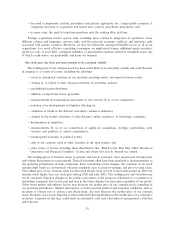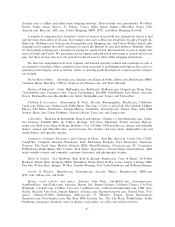eBay 2004 Annual Report Download - page 55
Download and view the complete annual report
Please find page 55 of the 2004 eBay annual report below. You can navigate through the pages in the report by either clicking on the pages listed below, or by using the keyword search tool below to find specific information within the annual report.API, and delays in reporting accurate Ñnancial information. We may be unable to eÅectively upgrade
and expand our systems in a timely manner or smoothly integrate any newly developed or purchased
technologies or businesses with our existing systems, and any failure to do so could result in problems
on our sites. For example, in October 2004, we experienced unscheduled downtime on the PayPal
website related to system upgrades. Despite our eÅorts to increase site scalability and reliability, our
infrastructure could prove unable to handle a larger volume of customer transactions. Any failure to
accommodate transaction growth could impair customer satisfaction, lead to a loss of customers,
impair our ability to add customers, or increase our costs, all of which would harm our business.
Further, steps to increase the reliability and redundancy of our systems are expensive, reduce our
margins, and may not be successful in reducing the frequency or duration of unscheduled downtime.
‚Customer Account Billing. Our revenues depend on prompt and accurate billing processes. We
recently completed a signiÑcant project to enhance our billing software. Problems with the conversion
to the new billing system during the second and third quarters of 2004 caused incorrect account
balance totals to be displayed for some users. In July 2004, a complaint seeking class action status was
Ñled alleging that eBay improperly billed its users and improperly debited some user accounts. The
complaint was recently amended to include a larger variety of billing related problems and a longer
time frame. While these problems have been corrected and we believe that no users were overcharged,
our failure to grow our transaction-processing capabilities to accommodate the increasing number of
transactions that must be billed would harm our business and our ability to collect revenue.
‚Customer Support. We are expanding our customer support operations to accommodate the in-
creased number of users and transactions on our websites and the increased level of trust and safety
activity we provide worldwide. If we are unable to provide these operations in a cost-eÅective manner,
users of our websites may have negative experiences, current and future revenues could suÅer, and our
operating margins may decrease.
We must continue to hire, train, and manage new employees at a rapid rate. If our new hires perform
poorly, if we are unsuccessful in hiring, training, managing, and integrating these new employees, or if we are
not successful in retaining our existing employees, our business may be harmed. To manage the expected
growth of our operations and personnel, we will need to improve our transaction processing, operational and
Ñnancial systems, procedures, and controls. This is a special challenge as we acquire new operations with
diÅerent systems. Our current and planned personnel, systems, procedures, and controls may not be adequate
to support our future operations. The additional headcount and capital investments we are adding increase our
cost base, which will make it more diÇcult for us to oÅset any future revenue shortfalls by expense reductions
in the short term.
Our business is adversely aÅected by anything that causes our users to spend less time on their
computers, including seasonal factors and national events.
Anything that diverts our users from their customary level of usage of our websites could adversely aÅect
our business. We would therefore be adversely aÅected by geopolitical events such as war, the threat of war, or
terrorist activity, and natural disasters, such as hurricanes or earthquakes. Similarly, our results of operations
historically have been seasonal because many of our users reduce their activities on our websites with the onset
of good weather during the summer months, and on and around national holidays. We have historically
experienced our strongest quarters of online growth in our Ñrst and fourth Ñscal quarters. PayPal has shown
similar seasonality, especially in the fourth Ñscal quarter. We expect these patterns of seasonality to become
more pronounced as our websites gain acceptance by a broader base of mainstream users and as the size of our
European operations, which experience greater seasonality, grows relative to our other operations.
Use of our services for illegal purposes could harm our business.
The law relating to the liability of providers of online services for the activities of their users on their
service is currently unsettled in the United States and internationally. We are aware that certain goods, such as
weapons, adult material, tobacco products, alcohol, and other goods that may be subject to regulation, have
53


